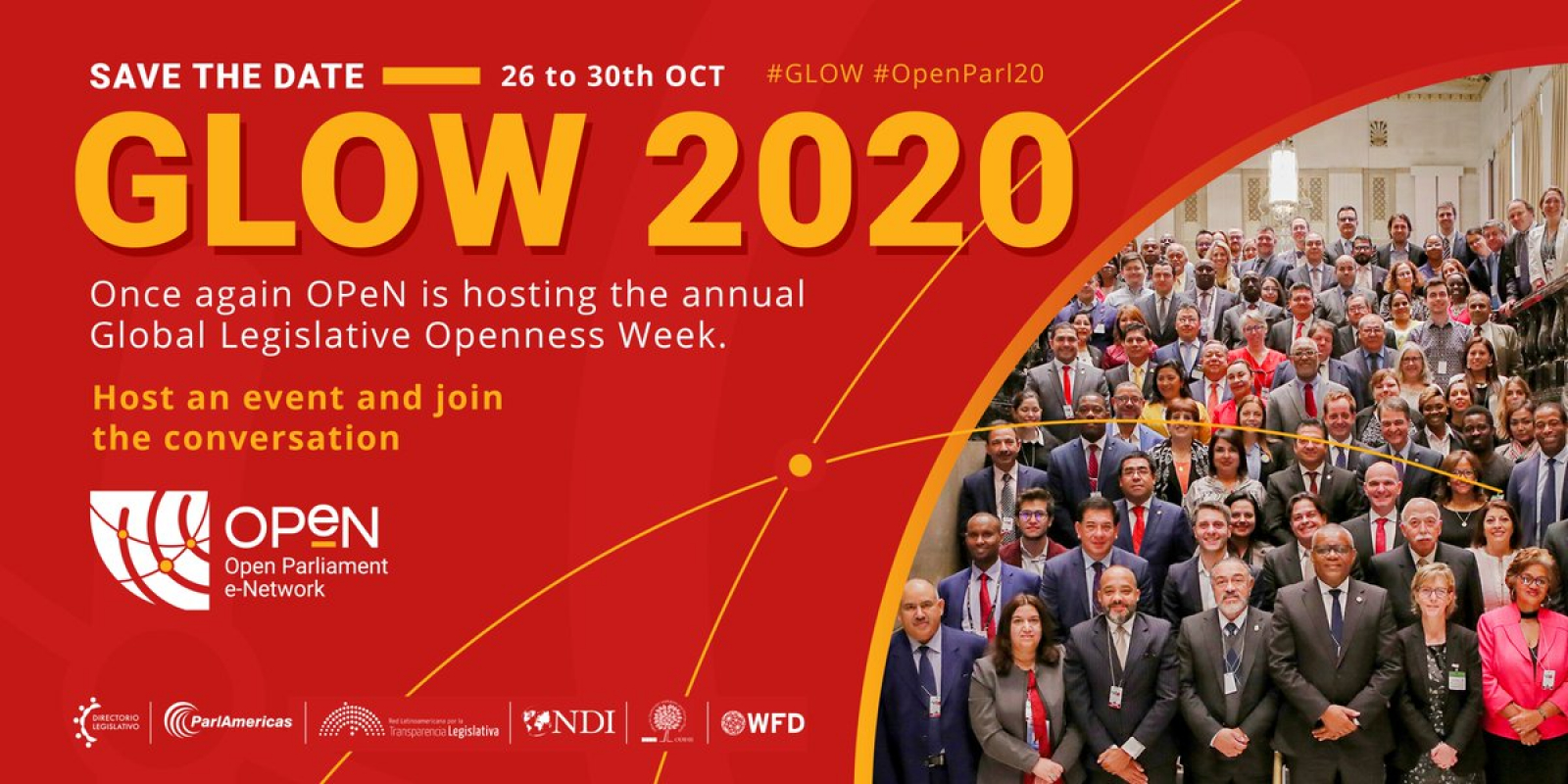GLOW: Open Parliaments prove their strength in an unprecedented year
From the COVID-19 pandemic to the heightening climate crisis to an increase in authoritarian overreach, 2020 has sorely tested the strength of democracies globally. Even while the world continues to reel from the effects of these multiple threats, at least one lesson of 2020 is already apparent: the parliaments most effective in upholding democratic norms and meeting citizen needs are the ones that have maintained a firm commitment to the principles of transparency, openness and accountability.
Recognizing the need for continued learning on open parliamentary engagement, the Open Parliament e-Network (comprised of Directorio Legislativo, National Democratic Institute, OSCE/ODIHR, ParlAmericas, Westminster Foundation for Democracy and the Latin American Legislative Transparency Network) recently held its fifth annual Global Legislative Openness Week (GLOW) as a forum for raising awareness, exchanging experiences, highlighting innovation and initiating joint projects.
In years past, GLOW has provided an opportunity for civil society organizations (CSOs) and parliaments around the world to showcase open parliament events and commitments on a virtual platform. This year, as the world itself has adjusted to a virtual reality, GLOW was well positioned to engage online with its community all around the world. More than 20 events were held throughout the week, gathering more than 2,500 participants including parliamentarians, parliamentary staff and CSOs. The week included activities hosted by parliaments in Brazil, Colombia, Costa Rica, Chile, Indonesia, North Macedonia and Paraguay; and CSOs in Armenia, Mexico and Ukraine that provided an introduction to open parliament concepts, contributed to the development and implementation of legislative Open Government Partnership (OGP) commitments and discussed digital strategies to ensure the continuity of these efforts during the pandemic, among other objectives. GLOW also coincided with the approval of a new Citizen Participation Regulation by the Congress of Chile, an innovative initiative stemming from a legislative commitment in Chile’s OGP action plan to increase citizen participation in the legislative process.
A key takeaway of GLOW 2020 was featured in the week’s final session: “Working towards an Open State” (available in english and spanish),which brought together more than 80 representatives from parliaments, civil society and academia to explore opportunities for parliaments to further contribute to the implementation and oversight of national commitments within the OGP framework. Reinforcing the critical role of parliamentary openness in crisis situations, the webinar also identified the need for strengthened collaboration between the executive and the legislative and judicial branches of governments. The discussion was moderated by Paul Maassen, Chief of Country Support at OGP, and led by Irina Pruidze, former Member of Parliament of Georgia; Paran Umar Tarawallie, clerk of the Parliament of Sierra Leone; Cara F. Zwibel, Canadian Civil Liberties Association; and Maria Liz Sosa Studotti, staff of the Senate of Paraguay.
The COVID-19 pandemic has shown that when the ties between branches of government are weak, democratic principles fall through the cracks. An “Open State approach” considers open government challenges and opportunities holistically across all branches and levels of government, and is an inspiring next step for the open parliament movement. However, it also requires stronger mechanisms for collaboration, participation and communication among the executive, judiciary and legislature. These mechanisms can take the form of national agreements of participation in the national open government multi-stakeholder forum, the inclusion of commitments on open parliament and open justice in action plans, and other approaches. This is more deeply explored in OPeN’s resource on Parliaments and Open Government. Such efforts would, without any doubt, strengthen democracy at these times of unprecedented challenges.
Open government processes are strengthened by a holistic approach. As OGP gears up to celebrate its tenth anniversary, OPeN encourages OGP member countries to consider how they can involve all branches in their work. And as we all move into 2021, OPeN partners are also eager to build on this momentum by re-imaging the OGP Legislative Engagement Policy to reflect the progress the open parliament community has made during the previous decade. Follow @openparl on Twitter to stay up to date on new developments and to let us know how you are working to create an open state.
Authors:
Victoria Welborn, National Democratic Institute
Emilie Lemieux, ParlAmericas
María Baron & Michelle Volpin, Directorio Legislativo
Julia Keutgen, Westminster Foundation for Democracy
This blogpost was originally posted on the Open Government Partnership website. Click here to read the original blog.





